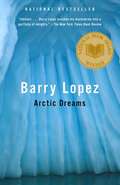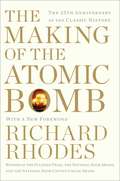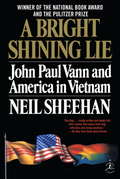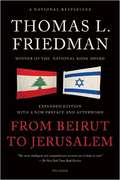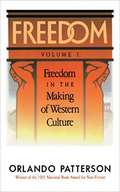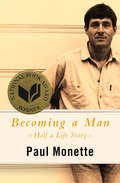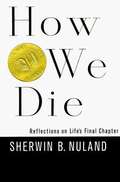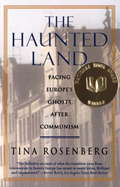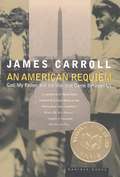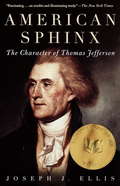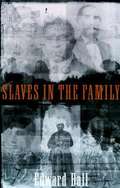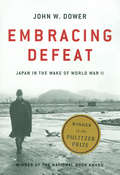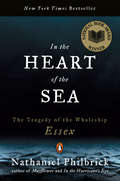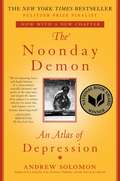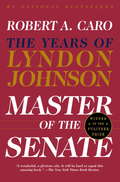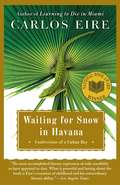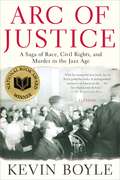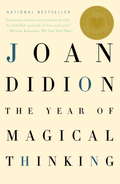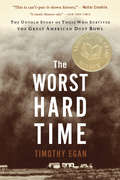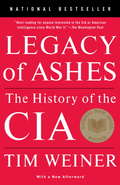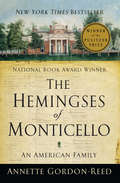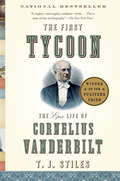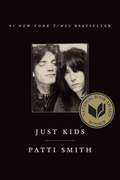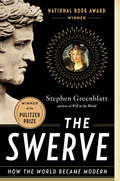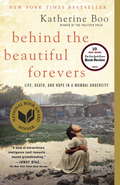Special Collections
National Book Award Winners - Non-Fiction
- Table View
- List View
Arctic Dreams
by Barry Holstun LopezThis National Book Award winner examines the Far North - its terrain, wildlife, and history of the Eskimo natives and intrepid explorers who arrived on its icy shores. What turns this compendium of biology, anthropology and history into a breathtaking study of profound originality is Lopez's unique meditation on how the landscape can shape our imagination, desires and dreams.
Making of the Atomic Bomb
by Richard RhodesTwenty-five years after its initial publication, The Making of the Atomic Bomb remains the definitive history of nuclear weapons and the Manhattan Project. From the turn-of-the-century discovery of nuclear energy to the dropping of the first bombs on Japan, Richard Rhodes’s Pulitzer Prize-winning book details the science, the people, and the socio-political realities that led to the development of the atomic bomb.
This sweeping account begins in the 19th century, with the discovery of nuclear fission, and continues to World War Two and the Americans’ race to beat Hitler’s Nazis. That competition launched the Manhattan Project and the nearly overnight construction of a vast military-industrial complex that culminated in the fateful dropping of the first bombs on Hiroshima and Nagasaki.
Reading like a character-driven suspense novel, the book introduces the players in this saga of physics, politics, and human psychology—from FDR and Einstein to the visionary scientists who pioneered quantum theory and the application of thermonuclear fission, including Planck, Szilard, Bohr, Oppenheimer, Fermi, Teller, Meitner, von Neumann, and Lawrence.
From nuclear power’s earliest foreshadowing in the work of H.G. Wells to the bright glare of Trinity at Alamogordo and the arms race of the Cold War, this dread invention forever changed the course of human history, and The Making of The Atomic Bomb provides a panoramic backdrop for that story.
Richard Rhodes’s ability to craft compelling biographical portraits is matched only by his rigorous scholarship. Told in rich human, political, and scientific detail that any reader can follow, The Making of the Atomic Bomb is a thought-provoking and masterful work.
Winner of the Pulitzer Prize.
Winner of the National Book Award
A Bright Shining Lie
by Neil SheehanOutspoken and fearless, John Paul Vann arrived in Vietnam in 1962, full of confidence in America's might and right to prevail. A Bright Shining Lie reveals the truth about the war in Vietnam as it unfolded before Vann's eyes: the arrogance and professional corruption of the U.S. military system of the 1960s, the incompetence and venality of the South Vietnamese army, the nightmare of death and destruction that began with the arrival of the American forces. Witnessing the arrogance and self-deception firsthand, Vann put his life and career on the line in an attempt to convince his superiors that the war should be fought another way. But by the time he died in 1972, Vann had embraced the follies he once decried. He went to his grave believing that the war had been won.
A haunting and critically acclaimed masterpiece, A Bright Shining Lie is a timeless account of the American experience in Vietnam–a work that is epic in scope, piercing in detail, and told with the keen understanding of a journalist who was actually there. Neil Sheehan' s classic serves as a stunning revelation for all who thought they understood the war.
Winner of the Pulitzer Prize.
Winner of the National Book Award
From Beirut to Jerusalem
by Thomas L. Friedman"Friedman, who twice garnered the Pulitzer as a New York Times correspondent in Lebanon and Israel, further delineates the two countries in this provocative, absorbing memoir cum political and social analysis. A condensed, incisive history of the Middle East is proffered, as well as personal reflections on his 10-year sojourn: the issue of Friedman's Jewishness in Beirut, the fact that he was the Times 's first Jewish reporter in Israel, the bombing of his apartment in Beirut by the PLO, which took the lives of his Lebanese news assistant's children." -From Publishers Weekly
Winner of the National Book Award
Freedom in the Making of Western Culture
by Orlando PattersonThe projected two-volume history of freedom traces the evolution of freedom from Greece in the sixth and fifth centuries BC through the permutations wrought by imperial Rome and the Middle Ages. Unsurprisingly, the Jamaican- born Patterson, long-concerned with the problems of oppression in both his early novels and later analytic studies, is particularly good on the relationship between the birth of freedom and the institution of slavery.
Winner of the National Book Award
Becoming a Man
by Paul MonetteThe National Book Award–winning coming-out memoir. &“One of the most complex, moral, personal, and political books to have been written about gay life&” (LA Weekly). Paul Monette grew up all-American, Catholic, overachieving . . . and closeted. As a child of the 1950s, a time when a kid suspected of being a &“homo&” would routinely be beaten up, Monette kept his secret throughout his adolescence. He wrestled with his sexuality for the first thirty years of his life, priding himself on his ability to &“pass&” for straight. The story of his journey to adulthood and to self-acceptance with grace and honesty, this intimate portrait of a young man&’s struggle with his own desires is witty, humorous, and deeply felt. Before his death of complications from AIDS in 1995, Monette was an outspoken activist crusading for gay rights. Becoming a Man shows his courageous path to stand up for his own right to love and be loved. This ebook features an illustrated biography of Paul Monette including rare images and never-before-seen documents from the Paul Monette papers of the UCLA Library Special Collections.
How We Die
by Sherwin B. NulandAttempting to demythologize the process of dying, Nuland explores how we shall die, each of us in a way that will be unique. Through particular stories of dying--of patients, and of his own family--he examines the seven most common roads to death: old age, cancer, AIDS, Alzheimer's, accidents, heart disease, and strokes, revealing the facets of death's multiplicity. "It's impossible to read How We Die without realizing how earnestly we have avoided this most unavoidable of subjects, how we have protected ourselves by building a cultural wall of myths and lies. I don't know of any writer or scientist who has shown us the face of death as clearly, honestly and compassionately as Sherwin Nuland does here."--James Gleick.
*** Originally published in 1994 and on the New York Times bestseller list for weeks, this reprint includes an in-depth 2010 post-epilogue epilogue by the author.
Winner of the National Book Award
The Haunted Land
by Tina RosenbergThe Haunted Land is a look at how four newly democratic eastern European nations are dealing with the memories of forty years of communism. As one official orthodoxy replaces another, the people and governments of Germany, Poland, the Czech Republic, and Slovakia face ethical dilemmas as complex and wrenching as anything out of Kafka or Orwell. In the greatest moral drama of our time, Communist totalitarianism drew well-intentioned, even idealistic people into horrible crimes. Now, as formerly Communist nations attempt to atone for the past, there is the everpresent temptation to rewrite history to suit the demands of the present. Tina Rosenberg s journalistic triumph is to put a human face on the abstractions of intrigue and betrayal, memory and ideology. The stories in this book take place not just in the highest councils of government and courts of law, but also in smoky pubs and the most private chambers of the soul. The Haunted Land shows how people struggle with their own definitions of guilt as they learn their betrayers were their husbands, fathers, and best friends.
Winner of the Pulitzer Prize.
Winner of the National Book Award
An American Requiem
by James CarrollNational Book Award winner: This story of a family torn apart by the Vietnam era is &“a magnificent portrayal of two noble men who broke each other&’s hearts&” (Booklist). James Carroll grew up in a Catholic family that seemed blessed. His father, who had once dreamed of becoming a priest, instead began a career in J. Edgar Hoover&’s FBI, rising through the ranks and eventually becoming one of the most powerful men in the Pentagon, the founder of the Defense Intelligence Agency. Young Jim lived a privileged life, dating the daughter of a vice president and meeting the pope—all in the shadow of nuclear war, waiting for the red telephone to ring in his parents&’ house. James fulfilled the goal his father had abandoned, becoming a priest himself. His feelings toward his father leaned toward worship as well—until the tumult of the 1960s came between them. Their disagreements, over Martin Luther King, Jr. and the civil rights movement; turmoil in the Church; and finally, Vietnam—where the elder Carroll chose targets for US bombs—began to outweigh the bond between them. While one of James&’s brothers fled to Canada, another was in law enforcement ferreting out draft dodgers. James, meanwhile, served as a chaplain at Boston University, protesting the war in the streets but ducking news cameras to avoid discovery. Their relationship would never be the same again. Only after Carroll left the priesthood to become a writer, and a husband with children of his own, did he begin to understand fully the struggles his father had faced. In An American Requiem, the New York Times bestselling author of Constantine&’s Sword and Christ Actually offers a benediction, in &“a moving memoir of the effect of the Vietnam War on his family that is at once personal and the story of a generation . . . at once heartbreaking and heroic, this is autobiography at its best&” (Publishers Weekly).
American Sphinx
by Joseph J. EllisFor a man who insisted that life on the public stage was not what he had in mind, Thomas Jefferson certainly spent a great deal of time in the spotlight--and not only during his active political career. After 1809, his longed-for retirement was compromised by a steady stream of guests and tourists who made of his estate at Monticello a virtual hotel, as well as by more than one thousand letters per year, most from strangers, which he insisted on answering personally. In his twilight years Jefferson was already taking on the luster of a national icon, which was polished off by his auspicious death (on July 4, 1826); and in the subsequent seventeen decades of his celebrity--now verging, thanks to virulent revisionists and television documentaries, on notoriety--has been inflated beyond recognition of the original person.
For the historian Joseph J. Ellis, the experience of writing about Jefferson was "as if a pathologist, just about to begin an autopsy, has discovered that the body on the operating table was still breathing." In American Sphinx, Ellis sifts the facts shrewdly from the legends and the rumors, treading a path between vilification and hero worship in order to formulate a plausible portrait of the man who still today "hover[s] over the political scene like one of those dirigibles cruising above a crowded football stadium, flashing words of inspiration to both teams." For, at the grass roots, Jefferson is no longer liberal or conservative, agrarian or industrialist, pro- or anti-slavery, privileged or populist. He is all things to all people. His own obliviousness to incompatible convictions within himself (which left him deaf to most forms of irony) has leaked out into the world at large--a world determined to idolize him despite his foibles.
From Ellis we learn that Jefferson sang incessantly under his breath; that he delivered only two public speeches in eight years as president, while spending ten hours a day at his writing desk; that sometimes his political sensibilities collided with his domestic agenda, as when he ordered an expensive piano from London during a boycott (and pledged to "keep it in storage"). We see him relishing such projects as the nailery at Monticello that allowed him to interact with his slaves more palatably, as pseudo-employer to pseudo-employees. We grow convinced that he preferred to meet his lovers in the rarefied region of his mind rather than in the actual bedchamber. We watch him exhibiting both great depth and great shallowness, combining massive learning with extraordinary naïveté, piercing insights with self-deception on the grandest scale. We understand why we should neither beatify him nor consign him to the rubbish heap of history, though we are by no means required to stop loving him. He is Thomas Jefferson, after all--our very own sphinx.
Winner of the National Book Award
Slaves in the Family
by Edward BallThe Ball family hails from South Carolina―Charleston and thereabouts. Their plantations were among the oldest and longest-standing plantations in the South. Between 1698 and 1865, close to four thousand black people were born into slavery under the Balls or were bought by them. In Slaves in the Family, Edward Ball recounts his efforts to track down and meet the descendants of his family's slaves. Part historical narrative, part oral history, part personal story of investigation and catharsis, Slaves in the Family is, in the words of Pat Conroy, "a work of breathtaking generosity and courage, a magnificent study of the complexity and strangeness and beauty of the word ‘family.'"
Winner of the National Book Award
Embracing Defeat
by John W. DowerDrawing on a vast range of Japanese sources and illustrated with dozens of astonishing documentary photographs, Embracing Defeat is the fullest and most important history of the more than six years of American occupation, which affected every level of Japanese society, often in ways neither side could anticipate. Dower, whom Stephen E. Ambrose has called "America's foremost historian of the Second World War in the Pacific," gives us the rich and turbulent interplay between West and East, the victor and the vanquished, in a way never before attempted, from top-level manipulations concerning the fate of Emperor Hirohito to the hopes and fears of men and women in every walk of life. Already regarded as the benchmark in its field, Embracing Defeat is a work of colossal scholarship and history of the very first order. John W. Dower is the Elting E. Morison Professor of History at the Massachusetts Institute of Technology. He is a winner of the National Book Critics Circle Award for War Without Mercy.
Winner of the National Book Award.
Pulitzer Prize Winner
In the Heart of the Sea
by Nathaniel Philbrick"With its huge, scarred head halfway out of the water and its tail beating the ocean into a white-water wake more than forty feet across, the whale approached the ship at twice its original speed--at least six knots. With a tremendous cracking and splintering of oak, it struck the ship just beneath the anchor secured at the cat-head on the port bow..."
In the Heart of the Sea brings to new life the incredible story of the wreck of the whaleship Essex--an event as mythic in its own century as the Titanic disaster in ours, and the inspiration for the climax of Moby-Dick. In a harrowing page-turner, Nathaniel Philbrick restores this epic story to its rightful place in American history.
In 1820, the 240-ton Essex set sail from Nantucket on a routine voyage for whales. Fifteen months later, in the farthest reaches of the South Pacific, it was repeatedly rammed and sunk by an eighty-ton bull sperm whale. Its twenty-man crew, fearing cannibals on the islands to the west, made for the 3,000-mile-distant coast of South America in three tiny boats. During ninety days at sea under horrendous conditions, the survivors clung to life as one by one, they succumbed to hunger, thirst, disease, and fear.
In the Heart of the Sea tells perhaps the greatest sea story ever. Philbrick interweaves his account of this extraordinary ordeal of ordinary men with a wealth of whale lore and with a brilliantly detailed portrait of the lost, unique community of Nantucket whalers. Impeccably researched and beautifully told, the book delivers the ultimate portrait of man against nature, drawing on a remarkable range of archival and modern sources, including a long-lost account by the ship's cabin boy. At once a literary companion and a page-turner that speaks to the same issues of class, race, and man's relationship to nature that permeate the works of Melville, In the Heart of the Sea will endure as a vital work of American history.
Winner of the National Book Award
The Noonday Demon
by Andrew SolomonWith uncommon humanity, candor, wit, and erudition, award-winning author Andrew Solomon takes the reader on a journey of incomparable range and resonance into the most pervasive of family secrets. His contribution to our understanding not only of mental illness but also of the human condition is truly stunning.
The Noonday Demon examines depression in personal, cultural, and scientific terms. Drawing on his own struggles with the illness and interviews with fellow sufferers, doctors and scientists, policymakers and politicians, drug designers and philosophers, Solomon reveals the subtle complexities and sheer agony of the disease. He confronts the challenge of defining the illness and describes the vast range of available medications, the efficacy of alternative treatments, and the impact the malady has had on various demographic populations around the world and throughout history. He also explores the thorny patch of moral and ethical questions posed by emerging biological explanations for mental illness.
The depth of human experience Solomon chronicles, the range of his intelligence, and his boundless curiosity and compassion will change the reader's view of the world.
Master of the Senate
by Robert A. CaroThe most riveting political biography of our time, Robert A. Caro's life of Lyndon B. Johnson, continues. Master of the Senate takes Johnson's story through one of its most remarkable periods: his twelve years, from 1949 through 1960, in the United States Senate. Once the most august and revered body in politics, by the time Johnson arrived the Senate had become a parody of itself and an obstacle that for decades had blocked desperately needed liberal legislation. Caro shows how Johnson's brilliance, charm, and ruthlessness enabled him to become the youngest and most powerful Majority Leader in history and how he used his incomparable legislative genius--seducing both Northern liberals and Southern conservatives--to pass the first Civil Rights legislation since Reconstruction. Brilliantly weaving rich detail into a gripping narrative, Caro gives us both a galvanizing portrait of Johnson himself and a definitive and revelatory study of the workings of legislative power.
Winner of the National Book Award
Winner of the Pulitzer Prize
Waiting for Snow in Havana
by Carlos Eire"Have mercy on me, Lord, I am Cuban." In 1962, Carlos Eire was one of 14,000 children airlifted out of Havana--exiled from his family, his country, and his own childhood by Fidel Castro's revolution. Winner of the National Book Award, this stunning memoir is a vibrant and evocative look at Latin America from a child's unforgettable experience.Waiting for Snow in Havana is both an exorcism and an ode to a paradise lost. For the Cuba of Carlos's youth--with its lizards and turquoise seas and sun-drenched siestas--becomes an island of condemnation once a cigar-smoking guerrilla named Fidel Castro ousts President Batista on January 1, 1959. Suddenly the music in the streets sounds like gunfire. Christmas is made illegal, political dissent leads to imprisonment, and too many of Carlos's friends are leaving Cuba for a place as far away and unthinkable as the United States. Carlos will end up there, too, and fulfill his mother's dreams by becoming a modern American man--even if his soul remains in the country he left behind. Narrated with the urgency of a confession, Waiting for Snow in Havana is a eulogy for a native land and a loving testament to the collective spirit of Cubans everywhere. lost. More than that, it captures the terrible beauty of those times in our lives when we are certain we have died -- and then are somehow, miraculously, reborn.
Arc of Justice
by Kevin BoyleAn electrifying story of the sensational murder trial that divided a city and ignited the civil rights struggle
In 1925, Detroit was a smoky swirl of jazz and speakeasies, assembly lines and fistfights. The advent of automobiles had brought workers from around the globe to compete for manufacturing jobs, and tensions often flared with the KKK in ascendance and violence rising. Ossian Sweet, a proud Negro doctor-grandson of a slave-had made the long climb from the ghetto to a home of his own in a previously all-white neighborhood. Yet just after his arrival, a mob gathered outside his house; suddenly, shots rang out: Sweet, or one of his defenders, had accidentally killed one of the whites threatening their lives and homes.
And so it began-a chain of events that brought America's greatest attorney, Clarence Darrow, into the fray and transformed Sweet into a controversial symbol of equality. Historian Kevin Boyle weaves the police investigation and courtroom drama of Sweet's murder trial into an unforgettable tapestry of narrative history that documents the volatile America of the 1920s and movingly re-creates the Sweet family's journey from slavery through the Great Migration to the middle class. Ossian Sweet's story, so richly and poignantly captured here, is an epic tale of one man trapped by the battles of his era's changing times.
Arc of Justice is the winner of the 2004 National Book Award for Nonfiction.
The Year of Magical Thinking
by Joan DidionJoan Didion explores an intensely personal yet universal experience: several days before Christmas 2003, John Gregory Dunne and Joan Didion saw their only daughter, Quintana, fall ill with what seemed at first flu, then pneumonia, then complete septic shock. She was put into an induced coma and placed on life support. Days later, the night before New Year's Eve, the Dunnes were just sitting down to dinner after visiting the hospital when John Gregory Dunne suffered a massive and fatal coronary. In a second, this close, symbiotic partnership of forty years was over. Four weeks later, their daughter pulled through. Two months after that, arriving at LAX, she collapsed and underwent six hours of brain surgery at UCLA Medical Center to relieve a massive hematoma.
This powerful book is Didion's attempt to make sense of the weeks and then months that cut loose any fixed idea she ever had about death, about illness, about marriage and children and memory, about the shallowness of sanity, about life itself.
Winner of the National Book Award
The Worst Hard Time
by Timothy EganThe author, Timothy Egan, tells a touching story of the individuals and families that survived the depression and the great American dust bowl during the 1930's through walking the land, diaries of survivors and talking with those individuals who lived through Black Sunday and still live in the high plains, which came to be known as the dust bowl. These stories focus around the towns of Dalhart and Boise in the Texas panhandle and how, when the soil of the plains took to the air, after millions of acres of prairie grass was plowed under and for months blew 20 plus days out of 30, with temperatures in the 120 degree range or dropped below zero while farmers huddled in dugouts in the ground, mothers watched their children die of dust pneumonia, they still held to the land. As the decade wore on, FDR's new deal programs attempted to assist the families of the high plains and struggled with the greatest ecological disaster of our country.
Winner of the National Book Award
Legacy of Ashes
by Tim WeinerWith shocking revelations that made headlines in papers across the country, Pulitzer-Prize-winner Tim Weiner gets at the truth behind the CIA and uncovers here why nearly every CIA Director has left the agency in worse shape than when he found it; and how these profound failures jeopardize our national security.
The Hemingses of Monticello
by Annette Gordon-ReedWinner of the National Book Award and the Pulitzer Prize
This epic work tells the story of the Hemingses, whose close blood ties to our third president had been systematically expunged from American history until very recently. Now, historian and legal scholar Annette Gordon-Reed traces the Hemings family from its origins in Virginia in the 1700s to the family's dispersal after Jefferson's death in 1826.
The First Tycoon
by T. J. StilesA gripping, groundbreaking biography of the combative man whose genius and force of will created modern capitalism.
Founder of a dynasty, builder of the original Grand Central, creator of an impossibly vast fortune, Cornelius "Commodore" Vanderbilt is an American icon. Humbly born on Staten Island during George Washington's presidency, he rose from boatman to builder of the nation's largest fleet of steamships to lord of a railroad empire. Lincoln consulted him on steamship strategy during the Civil War; Jay Gould was first his uneasy ally and then sworn enemy; and Victoria Woodhull, the first woman to run for president of the United States, was his spiritual counselor. We see Vanderbilt help to launch the transportation revolution, propel the Gold Rush, reshape Manhattan, and invent the modern corporation--in fact, as T. J. Stiles elegantly argues, Vanderbilt did more than perhaps any other individual to create the economic world we live in today.
In The First Tycoon, Stiles offers the first complete, authoritative biography of this titan, and the first comprehensive account of the Commodore's personal life. It is a sweeping, fast-moving epic, and a complex portrait of the great man. Vanderbilt, Stiles shows, embraced the philosophy of the Jacksonian Democrats and withstood attacks by his conservative enemies for being too competitive. He was a visionary who pioneered business models. He was an unschooled fistfighter who came to command the respect of New York's social elite. And he was a father who struggled with a gambling-addicted son, a husband who was loving yet abusive, and, finally, an old man who was obsessed with contacting the dead.
The First Tycoon is the exhilarating story of a man and a nation maturing together: the powerful account of a man whose life was as epic and complex as American history itself.
Winner of the National Book Award
Winner of the Pulitzer Prize
Just Kids
by Patti SmithPatti Smith would evolve as a poet and performer, and Robert Mapplethorpe would direct his highly provocative style toward photography. Bound in innocence and enthusiasm, they traversed the city from Coney Island to Forty-second Street, and eventually to the celebrated round table of Max's Kansas City, where the Andy Warhol contingent held court. In 1969, the pair set up camp at the Hotel Chelsea and soon entered a community of the famous and infamous- the influential artists of the day and the colorful fringe. It was a time of heightened awareness, when the worlds of poetry, rock and roll, art, and sexual politics were colliding and exploding. In this milieu, two kids made a pact to take care of each other. Scrappy, romantic, committed to create, and fueled by their mutual dreams and drives, they would prod and provide for one another during the hungry years. Just Kids begins as a love story and ends as an elegy. It serves as a salute to New York City during the late sixties and seventies and to its rich and poor, its hustlers and hellions. A true fable, it is a portrait of two young artists' ascent, a prelude to fame.
Winner of the National Book Award
The Swerve
by Stephen GreenblattWinner of the 2012 Pulitzer Prize for Non-Fiction
Winner of the 2011 National Book Award for Non-Fiction
One of the world's most celebrated scholars, Stephen Greenblatt has crafted both an innovative work of history and a thrilling story of discovery, in which one manuscript, plucked from a thousand years of neglect, changed the course of human thought and made possible the world as we know it.
Nearly six hundred years ago, a short, genial, cannily alert man in his late thirties took a very old manuscript off a library shelf, saw with excitement what he had discovered, and ordered that it be copied. That book was the last surviving manuscript of an ancient Roman philosophical epic, On the Nature of Things, by Lucretius--a beautiful poem of the most dangerous ideas: that the universe functioned without the aid of gods, that religious fear was damaging to human life, and that matter was made up of very small particles in eternal motion, colliding and swerving in new directions.
The copying and translation of this ancient book-the greatest discovery of the greatest book-hunter of his age-fueled the Renaissance, inspiring artists such as Botticelli and thinkers such as Giordano Bruno; shaped the thought of Galileo and Freud, Darwin and Einstein; and had a revolutionary influence on writers such as Montaigne and Shakespeare and even Thomas Jefferson.
Behind the Beautiful Forevers
by Katherine BooIn this brilliant, breathtaking book by Pulitzer Prize winner Katherine Boo, a bewildering age of global change and inequality is made human through the dramatic story of families striving toward a better life in Annawadi, a makeshift settlement in the shadow of luxury hotels near the Mumbai airport. As India starts to prosper, the residents of Annawadi are electric with hope.
Abdul, an enterprising teenager, sees “a fortune beyond counting” in the recyclable garbage that richer people throw away. Meanwhile Asha, a woman of formidable ambition, has identified a shadier route to the middle class. With a little luck, her beautiful daughter, Annawadi’s “most-everything girl,” might become its first female college graduate. And even the poorest children, like the young thief Kalu, feel themselves inching closer to their dreams.
But then Abdul is falsely accused in a shocking tragedy; terror and global recession rock the city; and suppressed tensions over religion, caste, sex, power, and economic envy turn brutal.
With intelligence, humor, and deep insight into what connects people to one another in an era of tumultuous change, Behind the Beautiful Forevers, based on years of uncompromising reporting, carries the reader headlong into one of the twenty-first century’s hidden worlds—and into the hearts of families impossible to forget.
Winner of the National Book Award | The PEN/John Kenneth Galbraith Award | The Los Angeles Times Book Prize | The American Academy of Arts and Letters Award | The New York Public Library’s Helen Bernstein Book Award NAMED ONE OF THE TEN BEST BOOKS OF THE YEAR BY The New York Times • The Washington Post • O: The Oprah Magazine • USA Today • New York • The Miami Herald • San Francisco Chronicle • Newsday NAMED ONE OF THE BEST BOOKS OF THE YEAR BY The New Yorker • People • Entertainment Weekly • The Wall Street Journal • The Boston Globe • The Economist • Financial Times • Newsweek/The Daily Beast • Foreign Policy • The Seattle Times • The Nation • St. Louis Post-Dispatch • The Denver Post • Minneapolis Star Tribune • Salon • The Plain Dealer • The Week • Kansas City Star • Slate • Time Out New York • Publishers Weekly NEW YORK TIMES BESTSELLER
